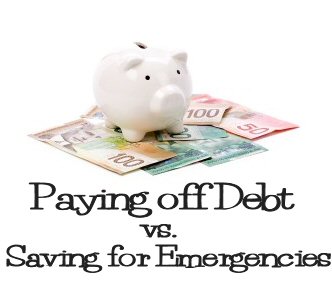Which is First: Paying off debt or preparing an Emergency fund ?

Taking the first few steps to ensure your future financial stability can be overwhelming. There is so much to do, trying to decide where to start can result in wasted time, and wasted time is wasted money. Eliminating debt is often the first priority, and rightly so. If debt is in the form of credit cards, interest payments could be a massive drain on your finances. Credit Card companies love offering low minimum payments because they know that consumers who pay only the minimum, and continue adding more debt, will be customers for life.
If you are spending less than you earn, you have the capacity to divert your excess income to long-term savings and investing, debt payments, and an emergency fund. You probably have a desire to put all of your excess income towards reducing that debt, and that’s understandable. Mathematically, that makes the most sense. However, by diverting all of your excess money to debt repayment without increasing your savings or investing, you are taking a risk. You are betting that nothing will cause you to incur more debt during the payoff process. Even though your money in a savings account will not earn as much as the amount you’ll save by paying off debt, you have to take into account “known unknowns” and “unknown unknowns.”
If the current financial crisis teaches us anything, it’s that for most people who deal only with loans, credit card debt and future expenses, risk management can be boiled to its most basic form: have an emergency fund. How can this be applied to paying off debt? Is the emergency fund more important?
If you direct all your excess money to paying off debt, you are likely to fall back into debt the moment an emergency arises. If your car breaks down and all your money has been directed towards your credit cards, you will have to use a credit card again to pay for the repair. You’ve taken one step forward, but now you’re forced to take two, three or four steps backward.
My suggestion is to balance building an emergency fund with paying off debt. When you are ready to divert your excess income to improving your financial condition, start with defining two goals: pay off all of your debt without acquiring more and build a solid emergency fund, which depending on the economy and the market for your skills, might consist of three months’, six months’ or one year’s worth of expenses.
Start by funding a base for your emergency fund. Pay the minimum to your credit cards or other debt, don’t accrue new debt, and send any extra money to a High Yield Account until you’ve built one month’s worth of expenses. This will allow you to mitigate some risk while paying down your debt.
Once you’ve reached a one-month buffer, start sending extra money to your credit card with the highest interest rate. I suggest allocating 75% of your excess funds to this first targeted credit card and 25% to your emergency fund. Keep sending money to your emergency fund month after month until your savings account cushion reaches the goal set above.
Once that target is reached, 100% of your surplus can be directed towards your highest interest rate card. You can rest easily with the knowledge that even while you’ve dramatically reduced the money you throw away to interest payments, you’re financially protected against a temporary loss of income or the typical emergencies you might face. This is just my opinion; maybe you have some thoughts that might be better. Doing anything is better than doing nothing. Do what works for you, if you’ve educated yourself.
Have you already signed up for Biztech peer to peer platform? Free Sign Up
Do you want to learn more? Please enter your email to subscribe for Free.
Please share the article.